Tech
High-converting shoe product photos, made effortless with AI Photoshoot
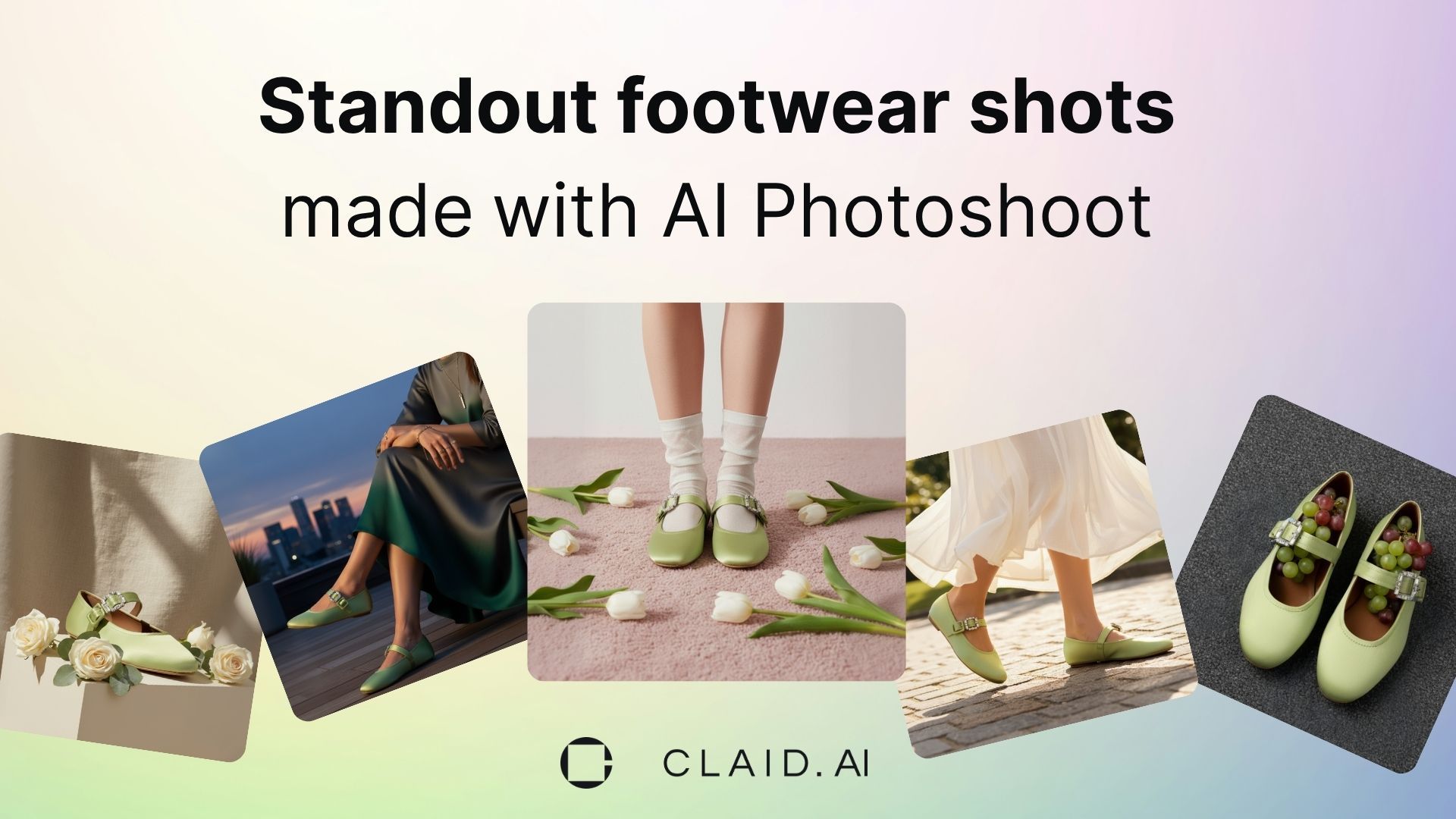
Consistent, high-quality, aesthetic shoe photography without hours of shooting? It’s real with the help of AI.
With our AI Photoshoot, you can create high-quality lifestyle and studio images without booking models, renting a studio, or spending hours editing shoe photos.
In this guide, we’ll explore how to use AI Photoshoot to design footwear visuals that fit your brand, test different backgrounds and angles, and create polished results in just a few clicks.
How to generate shoe product photos in AI Photoshoot
Let’s go through the process step by step.
If you don’t have a Claid account yet, create one and navigate to Editing Studio → AI Photoshoot. In the free account, you get 10 free generations on up to 5 uploaded images.
Step 1. Upload your footwear photo
Upload a high-resolution photo of your shoes.
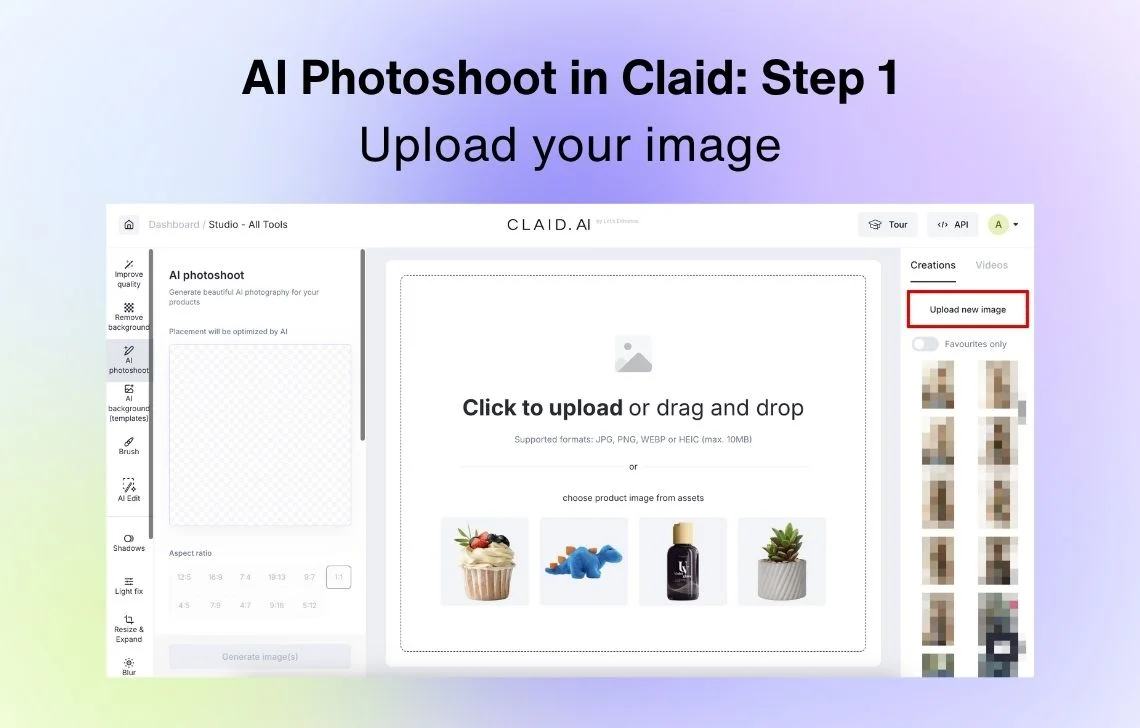
💡If you don’t have a picture with a transparent background, remove the background before using AI Photoshoot and other tools.
You can upload a pair of your shoes and a single shoe separately. The latter will allow you to experiment with single-shoe compositions.
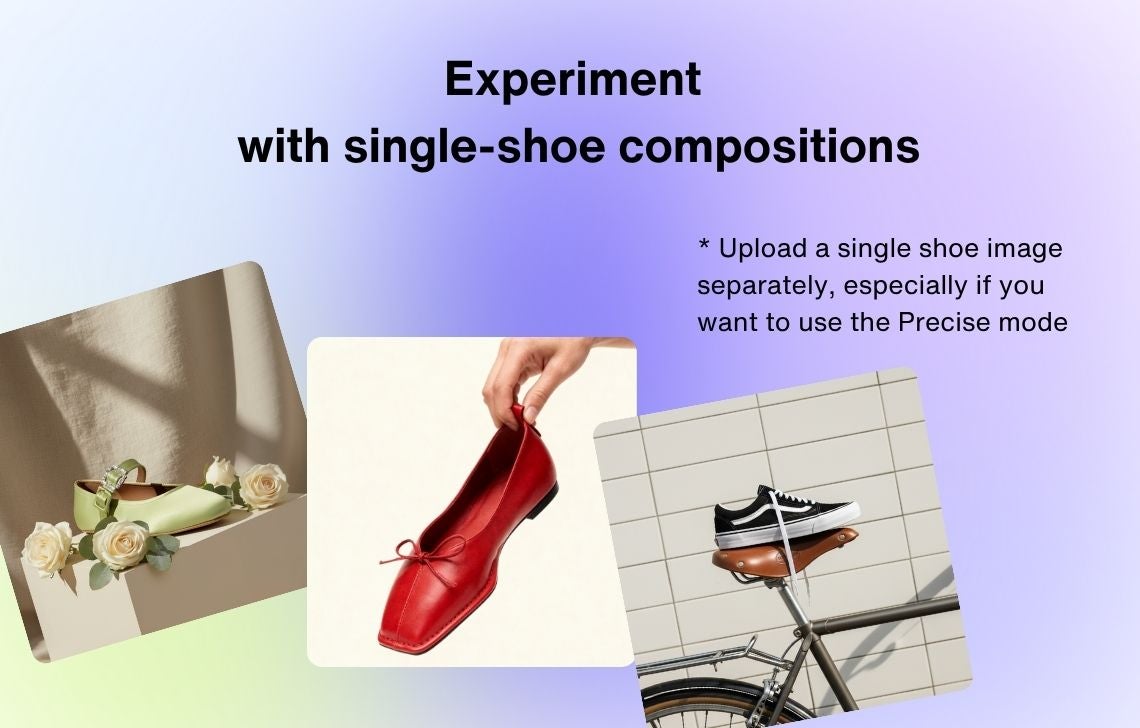
Step 2. Choose a generation mode
In AI Photoshoot, you can create shoe visuals using either Precise or Creative mode. Choose depending on how much control or flexibility you need.
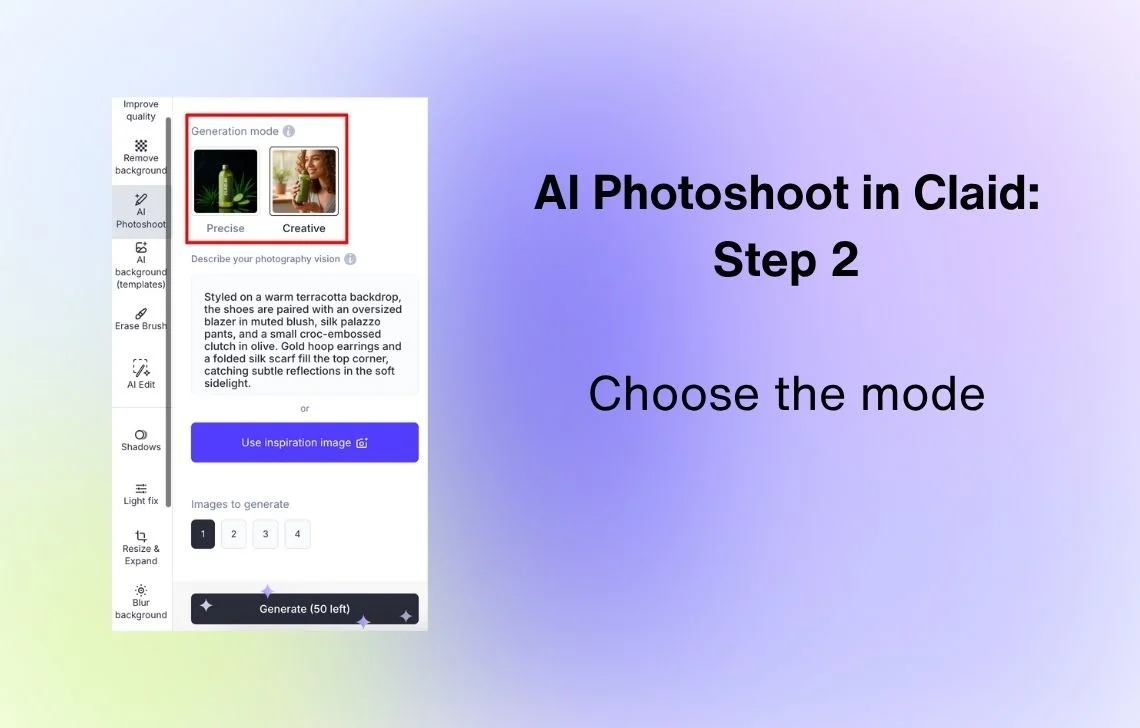
- Precise mode is perfect for clean catalog shots or marketplace listings. You can lock the position and angle of your shoe exactly as it is in the original photo, and test different backgrounds while keeping the product consistent.
- Creative mode is ideal for lifestyle or editorial content. You can show the shoes on a model, in motion, or styled in real-world scenes like sidewalks, studios, or seasonal setups. It also lets you experiment with angles (top-down flatlays, walking shots, etc.).
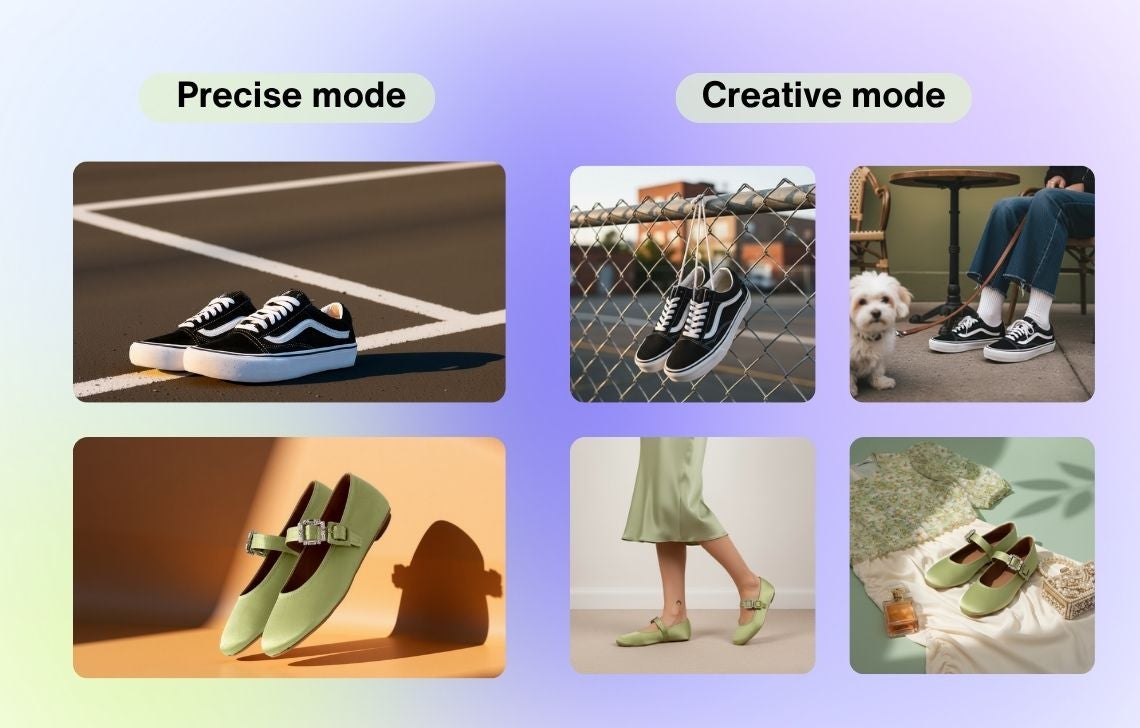
Step 3. Write a footwear photography prompt
In Precise mode, AI Photoshoot will generate a basic prompt for you based on the uploaded product. You can start from there or use Prompt Assistant, which will turn a simple idea into a full-fledged, detailed prompt.
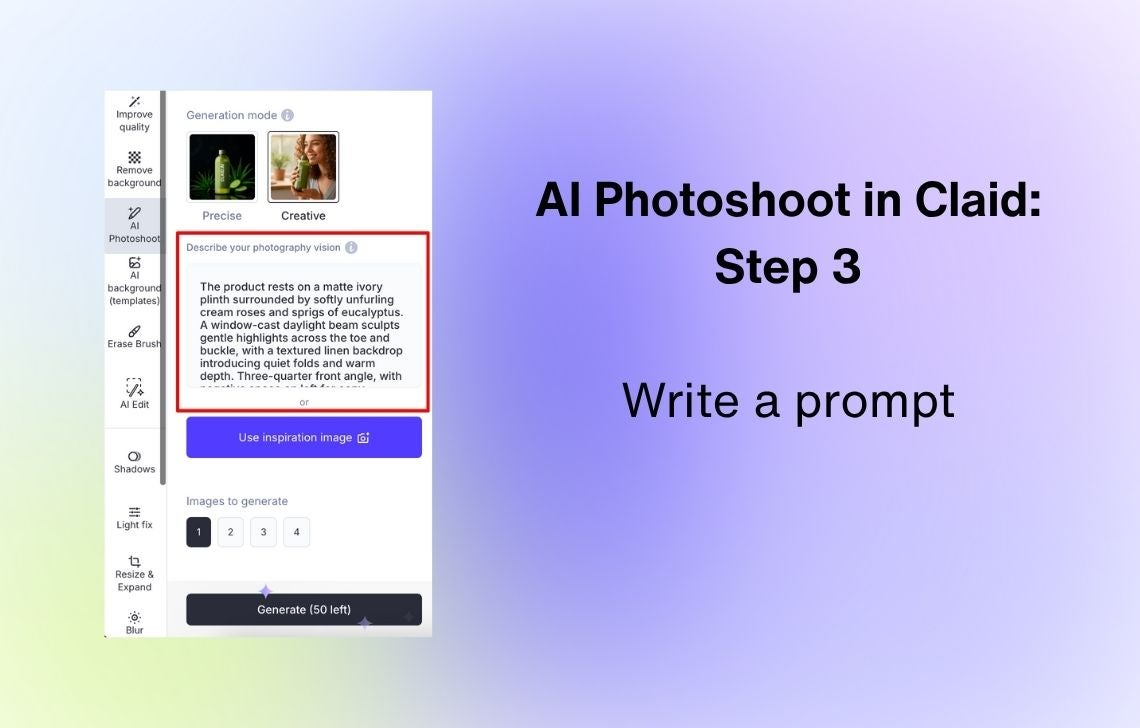
Writing a good image generation prompt is crucial for getting desired results. Here are some tips to get the most out of AI with smart footwear photoshoot prompts:
- Be specific. Describe the product, pose, and setting in detail.
- Mention light. Natural, studio, shadows, reflections, and so on.
- Don’t describe emotions or abstract ideas. For example, “A model, visible from the waist down, steps into the flats mid-motion. The image captures the act of becoming, with focus locked on the product” is a rather speculative description. A better version would be: “A model, shown from the waist down, slips it into a pair of flats. The camera focuses on the flats as she puts them on.”
- If you want an on-model shot, always describe the model, even if only the legs will be visible. For example, “The boots step through a shallow puddle reflecting city buildings” might lead to an unrealistic image of shoes walking without a person wearing them. A better version would be: “A woman wearing boots steps through a shallow puddle, with reflections of city buildings shimmering in the water.”
- Include framing cues for on-model shots. Full body, waist-down, close-up, and so on.
- Limit scene complexity. Don’t overcrowd your image with people or props.
Here are some prompt examples of different shoes in motion:
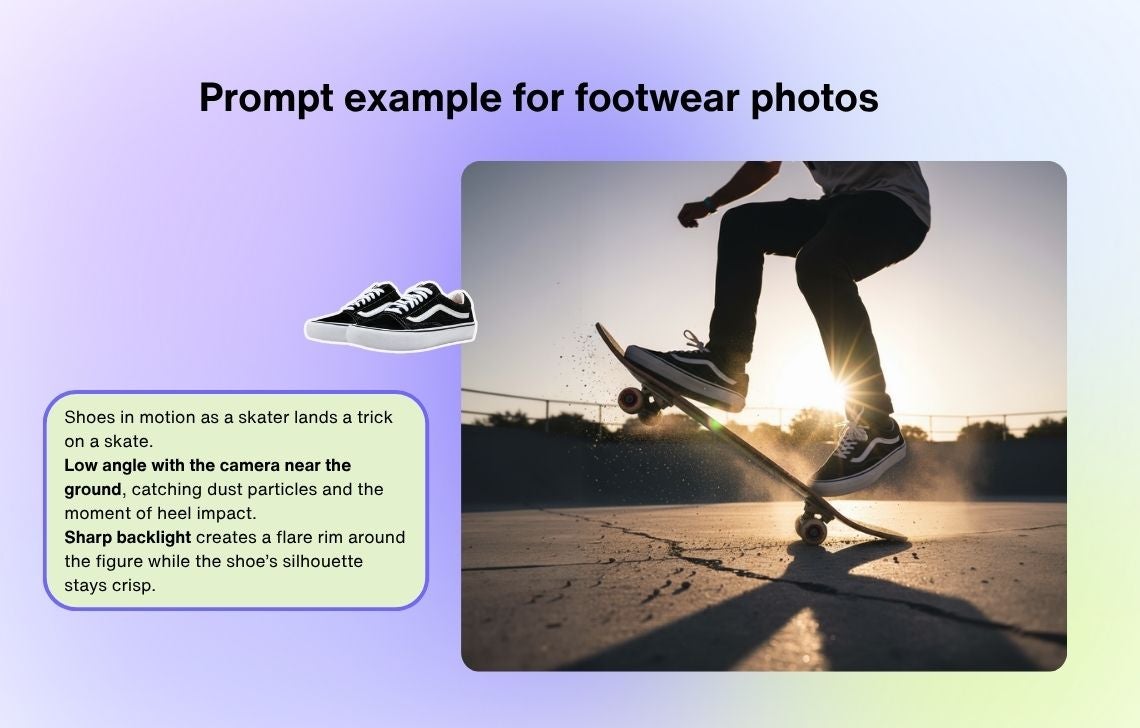
Want to reuse this sneaker product photography prompt? “Shoes in motion as a skater lands a trick on a skate. Low angle with the camera near the ground, catching dust particles and the moment of heel impact. Sharp backlight creates a flare rim around the figure while the shoe’s silhouette stays crisp.”
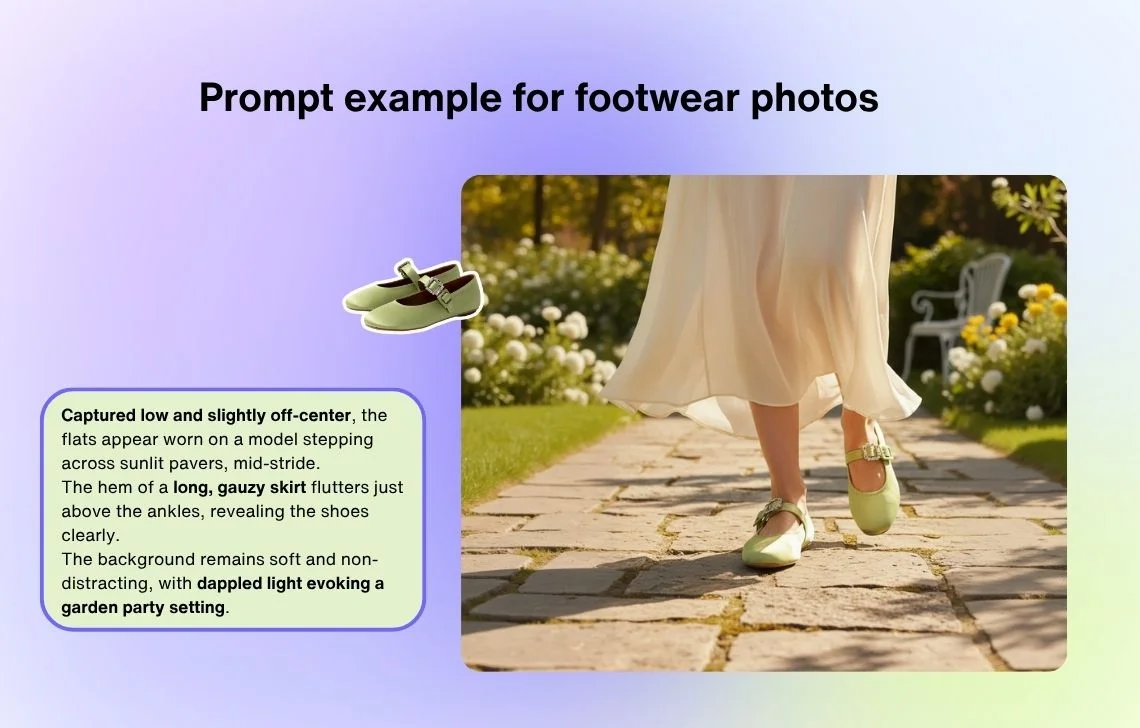
Want to reuse this prompt? “Captured low and slightly off-center, the flats appear worn on a model stepping across sunlit pavers, mid-stride. The hem of a long, gauzy skirt flutters just above the ankles, revealing the shoes clearly. The background remains soft and non-distracting, with dappled light evoking a garden party setting.”
Or use a reference image
In the Creative mode, you can also upload an inspirational image instead of writing a prompt. This is a great chance to recreate the shots you like and easily diversify angles in demonstrating your footwear products.
However, select your references carefully:
- Avoid references with unusual poses: AI might not get them right.
- Avoid references with a lot of people, especially if they’re wearing different types of shoes.
- Avoid references with completely different footwear: AI might slightly change your shoes.
- Go for references with a similar shoe style and a matching color scheme.
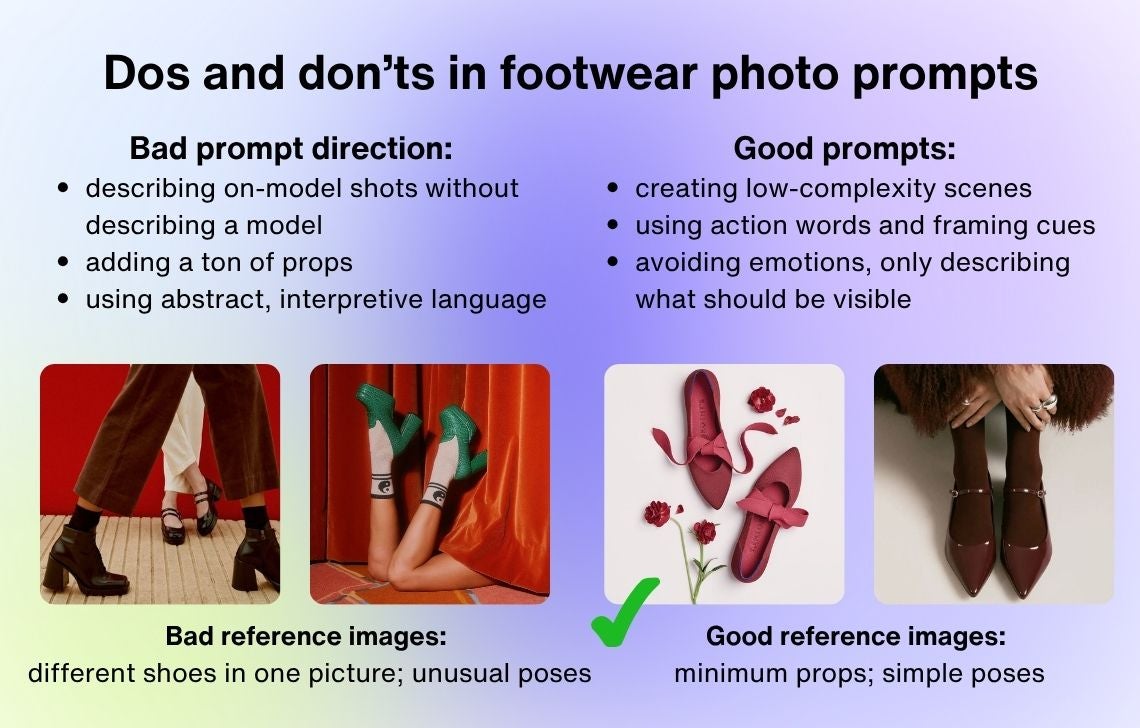
Step 4. Generate your AI shoe images
When your setup looks good, choose the output resolution (available in Precise mode) and the number of images to generate. AI Photoshoot can give you 1-4 images for each prompt so that you can select the best-fitting one.
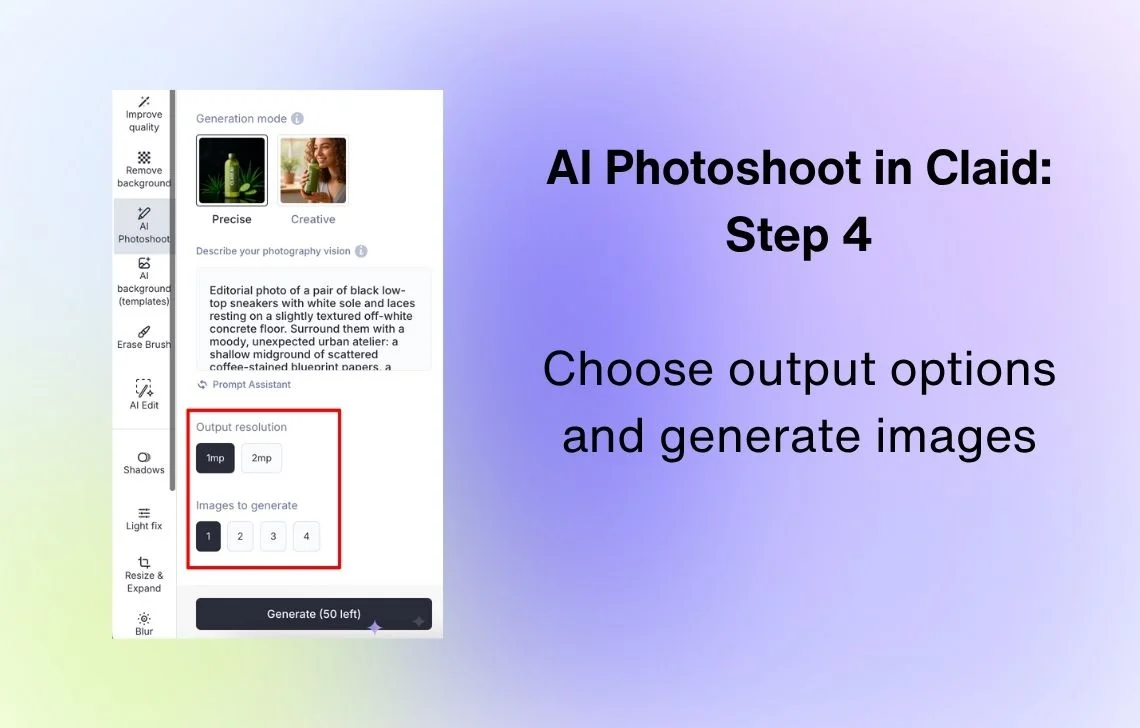
Step 5. Edit shoe photos if needed
You can refine the images of your sneakers, flats, or heels by using other Claid’s tools. For instance, you can erase unwanted objects, extend the background, and enhance resolution with smart upscaling.
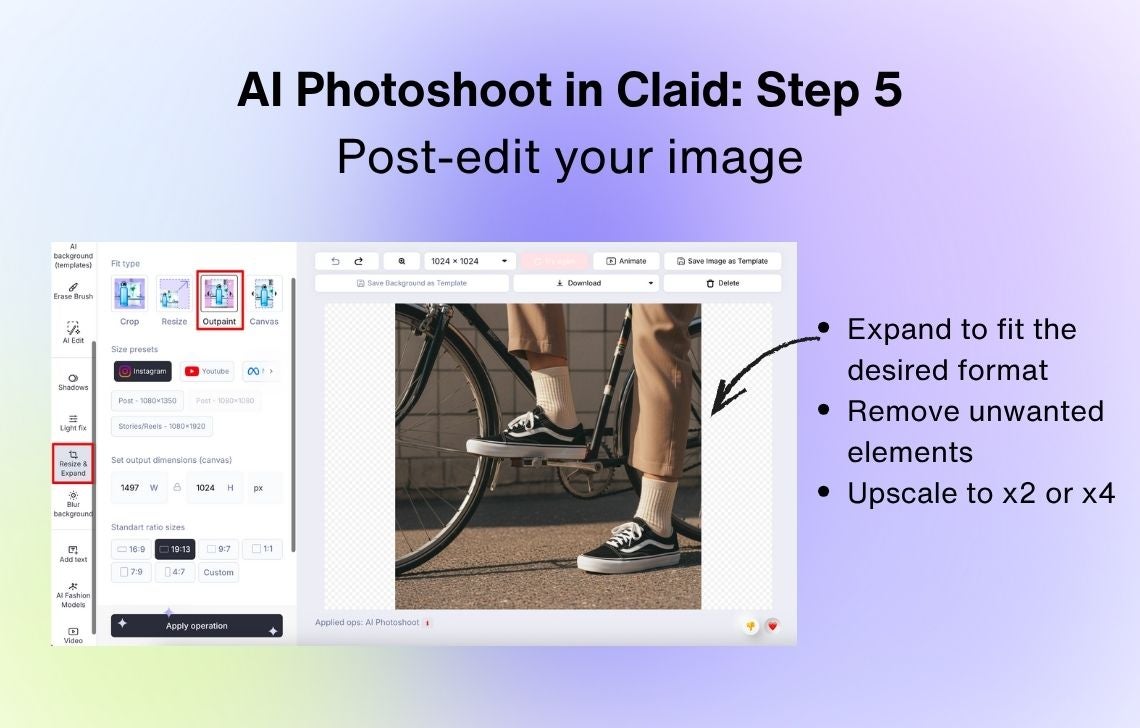
Try out all footwear photography directions
With product photography for shoes, you have 3 major types of images to experiment with:
- Studio shots with a simple background. Use Precise mode for clean, high-resolution images where the product stays exactly as captured and is placed against seamless paper backdrops, studio walls, light draping, or neutral textures.
- Flatlay compositions. You can style your shoes with different outfits, add accessories like socks or bags, and generate top-view scenes with props (magazines, flowers, etc.). This format works well for social media posts and lookbooks.
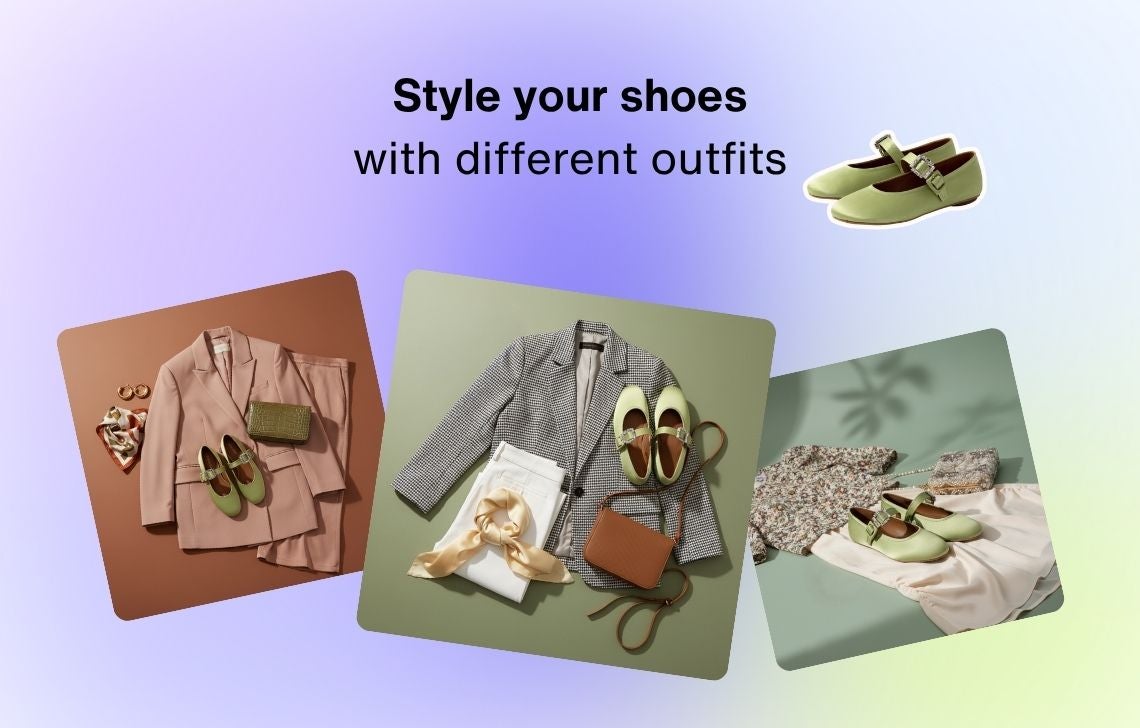
- Lifestyle photos. Show off your shoes worn on models: on streets, in studios, at events, or mid-motion.
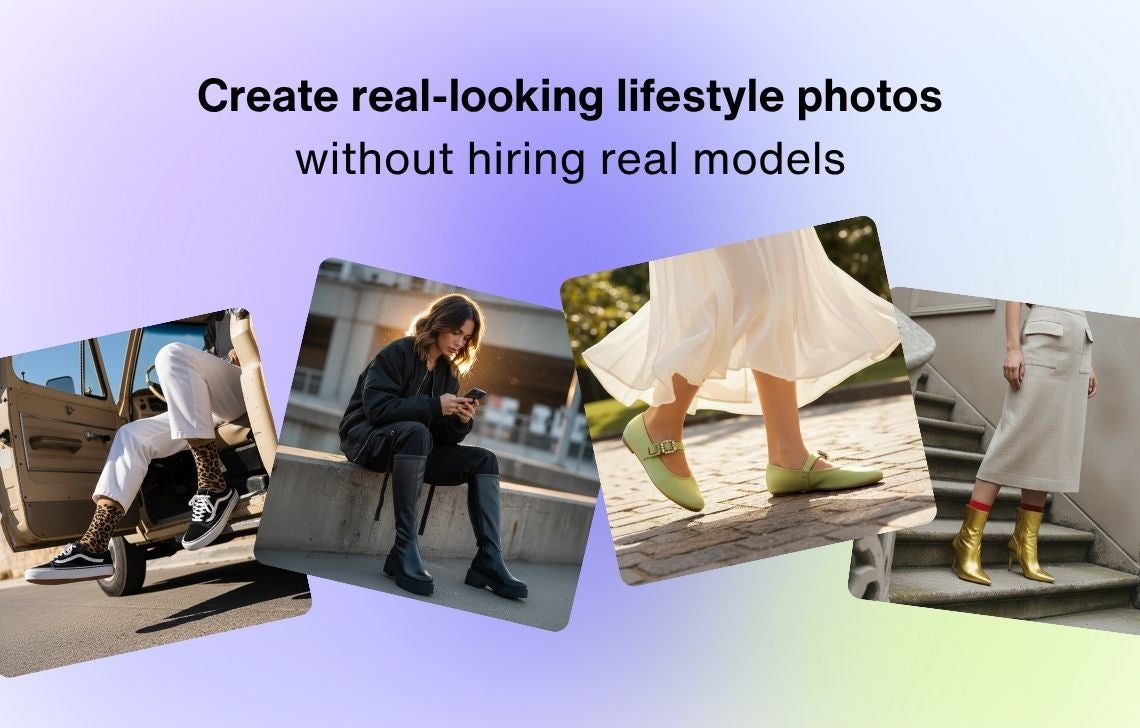
AI Photoshoot lets you create numerous shots of any type. Out of 1-2 product pictures, you’ll get visuals for social media, marketplaces, web and printed ads, catalogs, etc.
It also gives you endless possibilities to test creative, bold ideas.
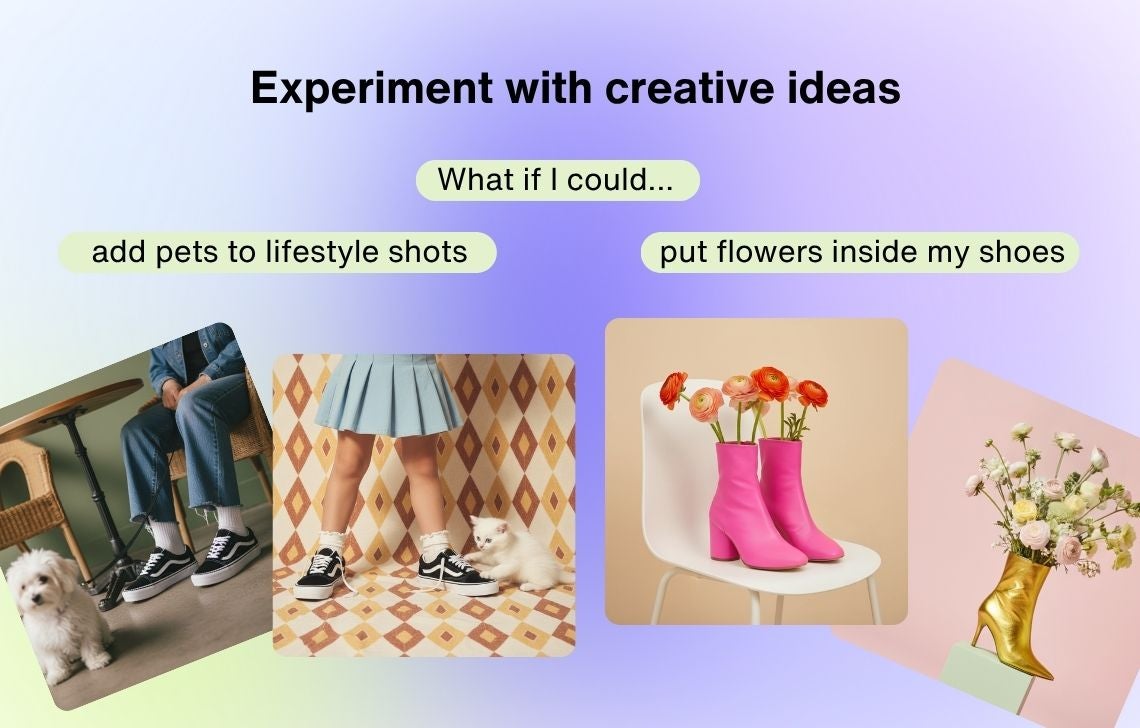
The impact of high-quality shoe product photos
Great visuals don’t just make your shoes look good: they drive real results, from higher conversion rates to stronger brand perception. But traditional photoshoots come with heavy costs: studio rental, photographers, models, retouching, and more.
Here’s an estimate of how the typical costs of a traditional shoot compare to AI-powered production:
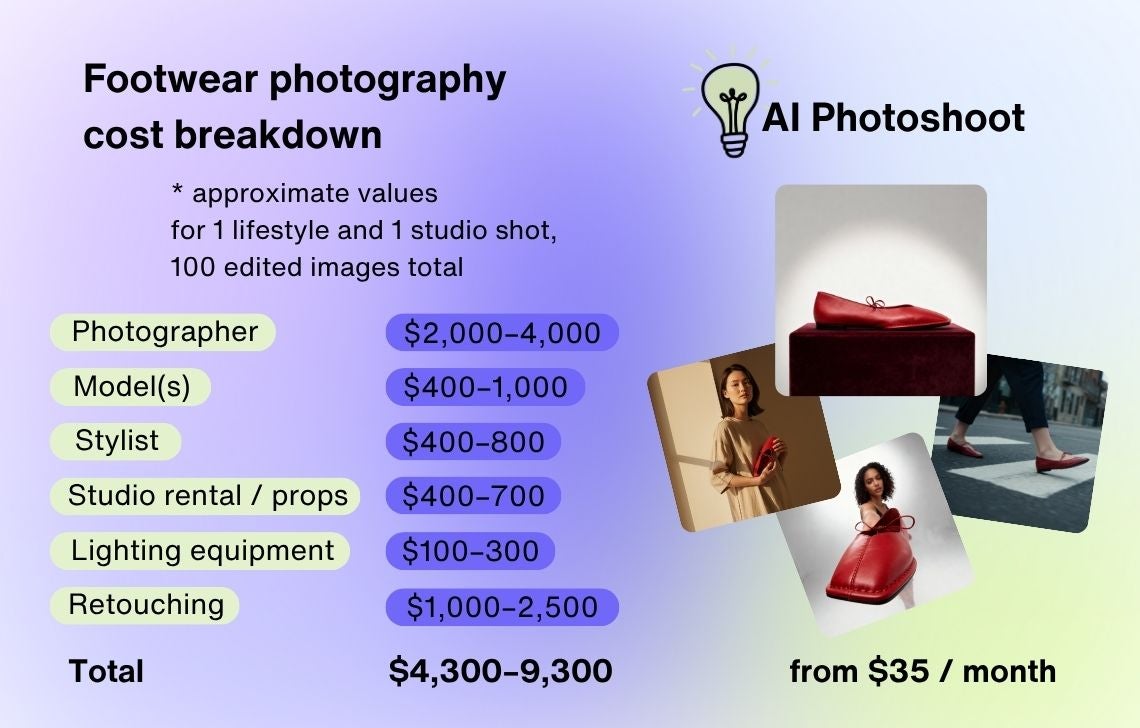
With the right AI tools, you can achieve the polished look without the overhead. Try AI Photoshoot to generate numerous footwear visuals.
AI shoe photography FAQ
How does AI help create shoe photos?
AI shoe photography and shoe photo editing tools let you create studio-quality shoe visuals without setting up a traditional photoshoot. Claid’s AI Photoshoot allows you to generate entire campaigns from a single image.
Can I show shoes on a model using AI?
Yes. In Claid’s AI Photoshoot (Creative mode), you can place your shoes on AI-generated models to show them worn naturally.
Can I add shoes to a photo?
Yes, but not in AI Photoshoot. Claid’s photo editor has the AI Backgrounds (Templates) section where you can upload your own image to use as a background. Note that using this functionality for shoes photography might lead to less realistic results compared to AI Photoshoot.
What kind of shoes works best with AI Photoshoot?
All types: from sneakers and boots to flats, heels, and sandals. If your shoes have some intricate details (unusual laces, decorative gems, etc.), make sure that you upload an image where these details are clearly visible so that AI doesn’t do unnecessary guesswork.
Will my shoe shape and design stay accurate?
Yes, especially in Precise mode. In Claid, AI-generated shoe pictures preserve the original proportions, angles, and product features. However, if some angles of your product remain unclear from the uploaded photo, AI can imagine unnecessary details. To prevent shoe changes, make sure that your source images show as much product as possible.
Is AI-generated shoe photography allowed on marketplaces?
For many marketplaces, yes, as long as the product remains accurate and the background is compliant.

Claid.ai
October 30, 2025